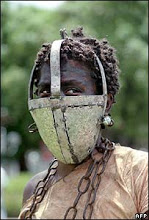By Garikai Chengu
Garikai Chengu is a scholar at Harvard University. Contact him on garikai.chengu@gmail.com
 Unbeknown to many, most of human history took place in Africa, where women were equal, if not superior, to men. For thousands of years, African societies were matriarchal and they prospered. By bringing an oppressive form of Colonial Christianity to Africa, Europeans replaced millennia of prosperous matriarchy with oppressive patriarchy.
Unbeknown to many, most of human history took place in Africa, where women were equal, if not superior, to men. For thousands of years, African societies were matriarchal and they prospered. By bringing an oppressive form of Colonial Christianity to Africa, Europeans replaced millennia of prosperous matriarchy with oppressive patriarchy.
The world’s first civilizations arose from the spiritual, economic and social efforts of African women and African women, in turn, went on to lead those Matriarchal societies.
Feminist artist Lauren Webber’s works on traditional fabrics at the First Floor Art Gallery in Zimbabwe explore the complex relationship between the past and present condition of African women, by exposing the continent’s long history of female dominance and how it has been subverted by Christian patriarchies.
The rituals and culture of African matriarchy did not celebrate violence; rather, they promoted fecundity, exchange and redistribution. Matriarchy in ancient Africa was not a mirror image of patriarchy today; because, it was not based on appropriation and violence.
Frantz Fanon once remarked, “Colonialism is not a thinking machine, nor a body endowed with reasoning faculties. It is violence in its natural state”. Webber illustrates how for centuries, Christianity has been the shield that justifies colonialism; what is less known, is that it has also served as the sword, up and down the African continent, leaving piles of bones in its wake. Just as violence cannot be separated from colonialism, Christianity cannot be separated from colonial violence.
Early man was unaware of the link between sexual intercourse and birth; they thought only women created life. Consequently, women were the first Gods, which formed the basis of gender equality in Africa.
Historian, Cheikh Anta Diop illustrates how as early as 10,000 BC women in Africa pioneered organized crop and livestock cultivation, thereby creating the pre-conditions for surplus, wealth and trade. African women are responsible for the greatest invention for the well-being of human kind, namely, food security. It is the practice of organized agriculture that made population expansion, food surpluses and civilization possible.
Pre-capitalist, matriarchal civilizations in Africa included: the Nigerian Zazzau, Sudanese Kandake, Angolan Nzinga, and Ashanti of Ghana, to name but a few. The quintessential African matriarchal system was most evident and most enduring in Black Ancient Egypt.
Women in Ancient Egypt owned and had complete control over both movable and immovable property, such as real estate in 3000 BC. As late as the 1960s, this right could not be claimed by women in some parts of the United States.
A close look at ancient Egyptian papyrus’ reveals that society was strictly matrilinial and inheritance and descent was through the female line. The Egyptian woman enjoyed the same legal and economic rights as the Egyptian man, and the proof of this is reflected in Egyptian art and historical inscriptions. Egypt was an unequal society, but the inequality was based much more upon differences in the social classes, rather than differences in gender.
From ancient legal documents, we know that women were able to manage and dispose of private property, including: land, portable goods, servants, slaves, livestock, and financial instruments, such as endowments and annuities. A woman could administer all her property independently and according to her free will and in several excavated cemeteries the richest tombs were those of women.
The independence and leadership roles of ancient Egyptian women are part of an African cultural pattern that began millennia ago and continued into recent times, until Europeans brought Colonial Christianity to Africa.
In the 1860s, the colonial explorer and Christian missionary, Dr. David Livingstone, wrote of meeting female chiefs in the Congo, and in most of the monarchical systems of traditional Africa, there were either one or two women of the highest rank who occupied a position on a par with that of the king or complementary to it.
Professor of Ancient African History, Barbara Lesko, illustrates how anthropologists who have studied African history and records of early travelers and missionaries tell us, “everywhere in Africa that one scrapes the surface one finds ethno-historical data on the authority once shared by women.”
In the years just before colonization, African women were largely equal to men. The significant value of African women’s productive labour in producing and processing food created and maintained their rights in domestic, political, cultural, economic, religious and social spheres, among others. Because women were central to production in these pre-class societies, systematic inequality between the sexes was nonexistent, and elder women in particular enjoyed relatively high status.
With the advent of Colonial Christianity, the marginalization of women came in several ways. Firstly, the true history of Jesus Christ was whitewashed, in order to subjugate Black Africans and promote a European male patriarchy. The Jesus that Africans were introduced to by European missionaries was a white skinned, blue eyed man.
It is a historical and Biblical fact that Jesus was actually a dark skinned man.The Bible itself offers evidence of Jesus’ dark skin; and The Book of Revelation likens Jesus’ feet to “fine brass, as if burned in a furnace.” In the Book of Daniel, it says the hair of the Messiah’s head would be “like the pure wool” of a lamb. The scholarly consensus is that Jesus was, like most first-century Jews, a dark-skinned man. According to The New Testament, Mary and Joseph travelled South among dark skinned people to hide baby Jesus from Herod. Clearly hiding a white baby amongst dark skinned people would not have been possible.
Jesus’ race is important because the historically false image of a white Jesus has been utilized to justify slavery and the genocide of millions of indigenous peoples in Africa and beyond.
Patriarchal Christianity, and its masculine fundamentalism, have brought to Africa the monogamous nuclear family unit, whose sole purpose was to pass on private property in the form of inheritance from one generation of males to the next. Under Colonial Christianity, the modern nuclear family is founded on the somewhat concealed domestic slavery of the wife.
A glance at the dictionary will reveal that the word family, has rather telling Latin origins. “Famulus” literally means domestic slave; and “familia,” signified the total number of slaves belonging to one man.
Colonial Christianity also brought to Africa the concept of the Victorian woman: a woman who should stay in the private domain and leave the “real work” to the men. Due to the Victorian concept of women held by colonialists, African women were excluded from the new religious, political, and socioeconomic systems.
The imported patriarchal religion does not allow women to play the leading roles they have in the indigenous African religion. In Ancient African religions it is not only God who is a “She”, but also the main guardian spirits and sacred principles are of the female gender. The concept of a Supreme Mother is also documented by Rosalind Jeffries, who, in a paper entitled “The Image of Woman in African Cave Art”, shows how in the African Creation stories, the Primordial Mother created woman then man.
Clearly, Europeans manipulated true Christianity for profit and plunder. If the colonialists’ understanding of Christianity could be used to justify rape, theft, murder and empire, then their understanding of Christianity is completely wrong. The barbarism of colonialism in Africa was committed in the name of Christianity, in clear violation of the teachings of Jesus Christ, Moses and the prophets, Muhammad, and founders of other great religions – all of whom pushed for just and equitable treatment of all of God’s children.
The greatest threat towards African women having a glorious future is our people’s ignorance of African women’s glorious past. Armed with knowledge, Africans must now fight to restore African women to a position of respect and dignity that exceeds that which she enjoyed before colonialism.





